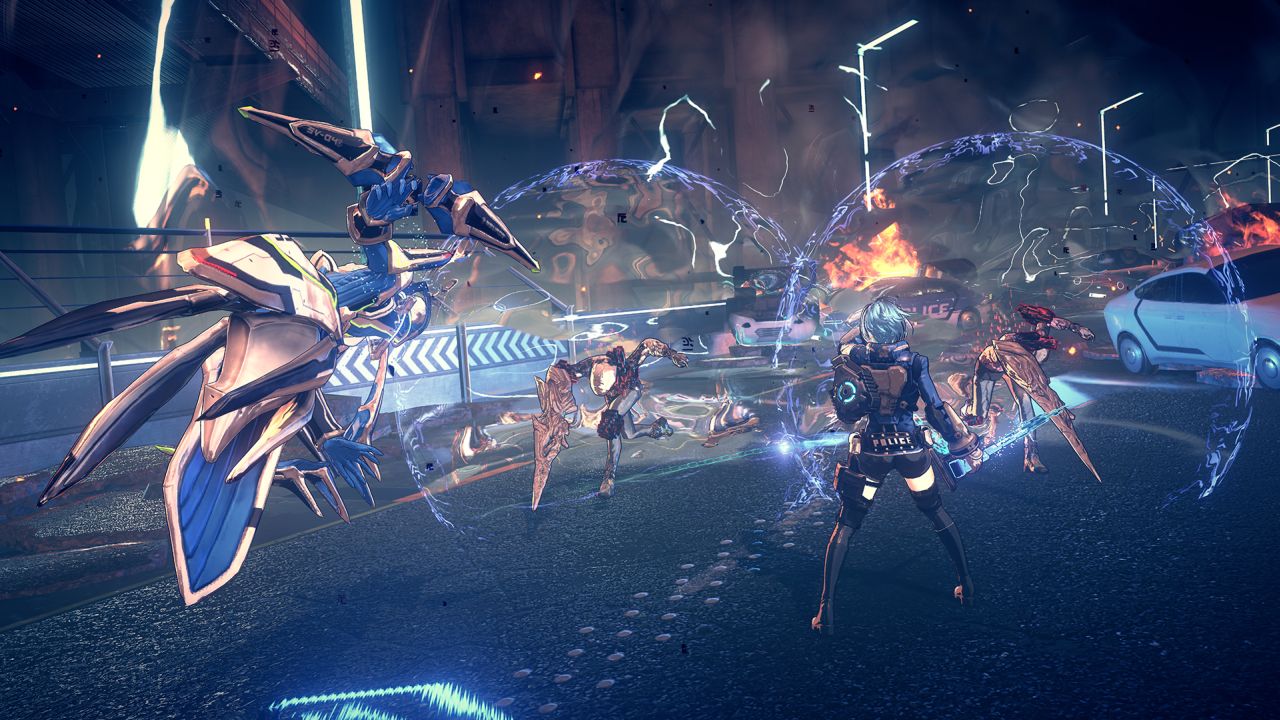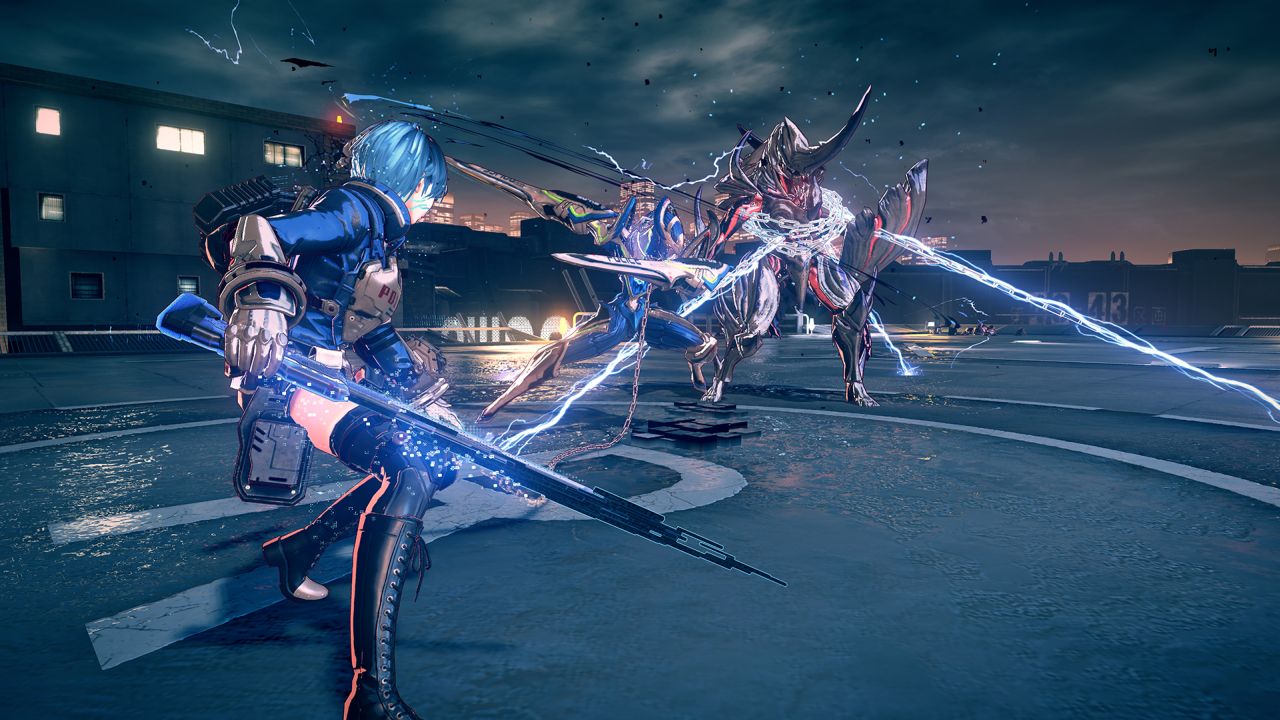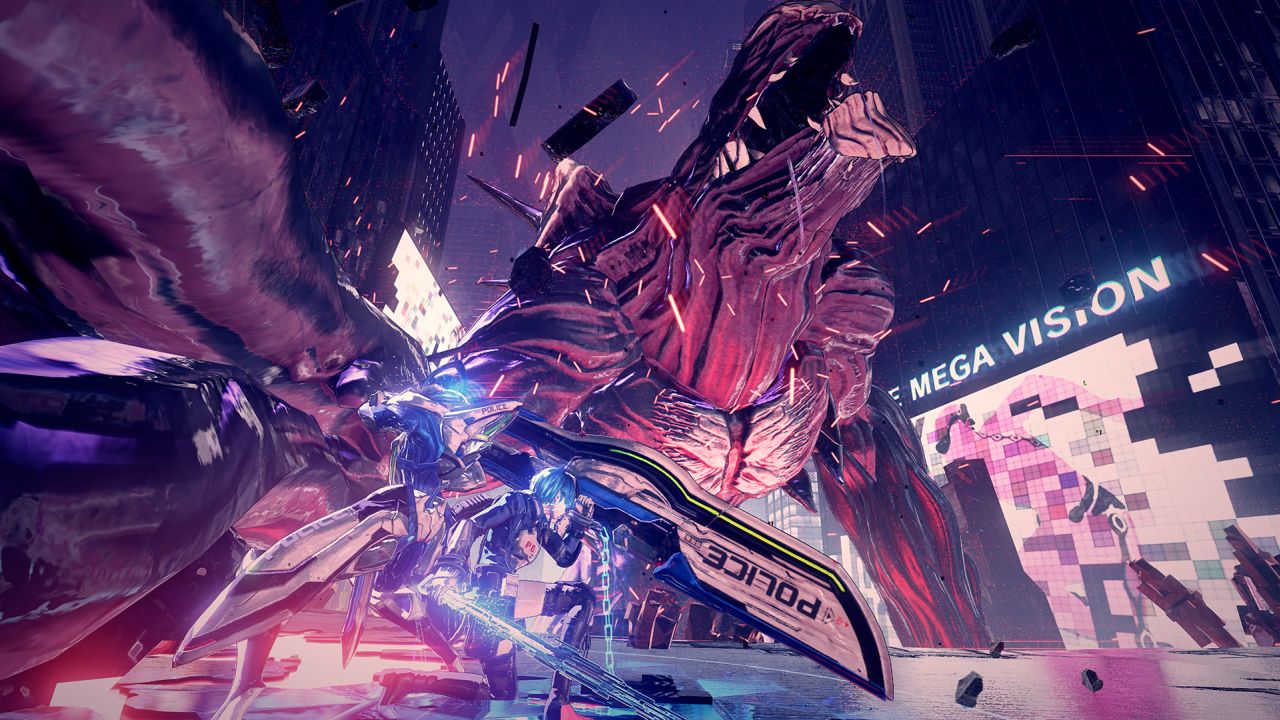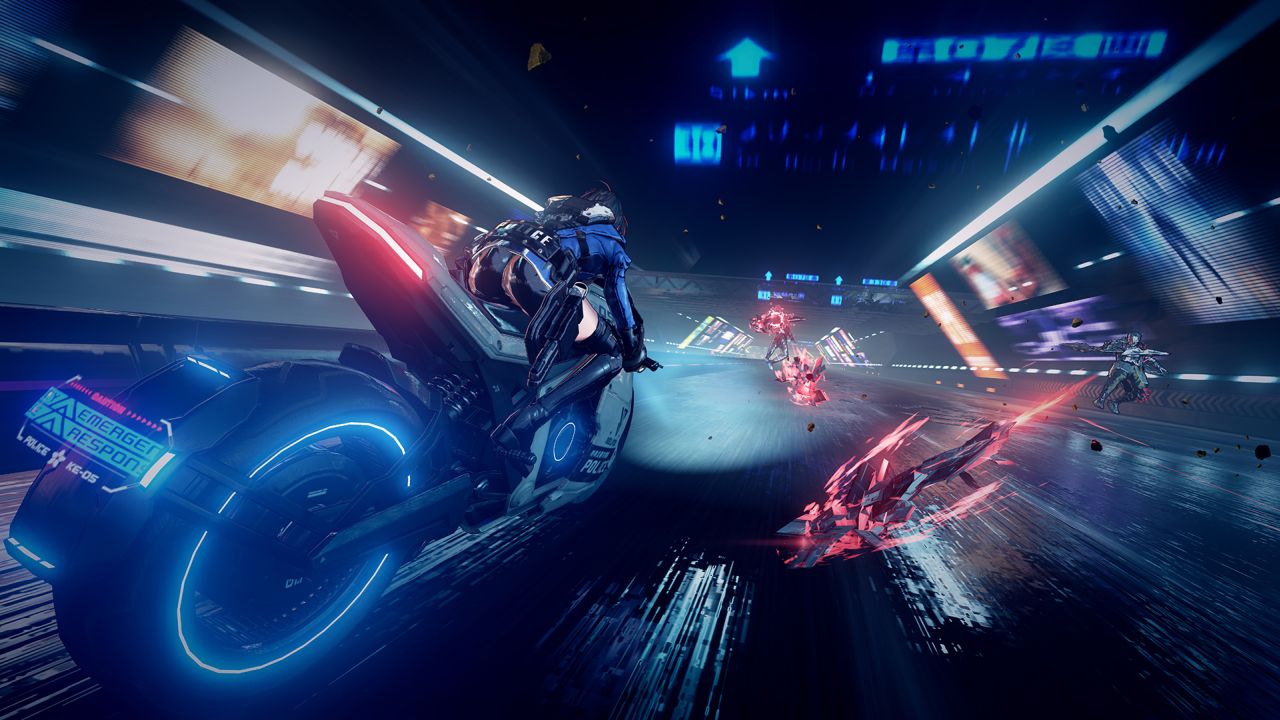Astral Chain Review
Unleashing the power from another dimension
Nintendo is fairly well known for having a few mega popular franchises and characters, and capitalizing on that success over the decades. Fans will argue about just how much the company leans on its back catalog and nostalgia, but there's no questioning the fairly consistent quality that others can only try to aspire to. With the Nintendo Switch console performing very successfully, after the somewhat disappointing Wii U, the publisher is also taking more risks with its catalog. Sure, there's still the expected lineup of Mario and Zelda games, but unique exclusives are also finding their way to the platform from third parties. Astral Chain is the latest such venture, an engaging and enjoyable third person action title that succeeds despite a few nagging issues.

The game takes players to the distant future, where a city called The Ark stands alone as the last remaining habitable place on Earth. We learn that ten years ago, mysterious portals began to open all over and spill a substance called Red Matter. This caused infections and mutations, leaving much of the planet uninhabitable. It also allowed creatures known as chimeras, invisible to the human eye, to enter our dimension and kidnap people. While The Ark withstood for a while, rifts began to open within the city as well. The regular police force is largely helpless, but a scientist named Yoseph Calvert created a subdivision called the Neuron task force, that helps fight against the chimera threat.
The scientist not only developed tech to allow his small task force to see and fight the monsters, but he also managed to capture and bind them, so that they'd obey and fight for their human owners. These police-controlled versions of the enemy are known as Legions. One member of the task force is Maximilian Howard, your father. Players get to choose to play as either the daughter or son of Max, and both are new cadets who gain a speedy entry into Neuron. But during your first mission, things go very wrong and everyone except you loses control of their Legion. As the last remaining officer with a Legion under his command, you must quickly find your footing, and continue to support the local police against the increasingly larger attacks.
The setup for the Astral Chain narrative is incredibly interesting and unique; capturing and turning the enemy against itself, the perspective of unwilling monsters bound under your control, and the dynamics of being a police officer in a world falling apart. Sure, it's a bit predicable in places and the dialog doesn't always shine, with very anime-like family drama and character interactions, but it's still a surprisingly engrossing story that keeps throwing well-executed twists.
The game makes an unusual choice by having the player not speak, and it lets your sibling and others do the conversing. If you pick the brother, your sister will speak, and vice versa. The dialog doesn't change much though, and with the amount of dramatic content, it makes much more sense to play as the brother, so that the acting is left to the sister sibling. In the opposite scenario, you're playing with a real crybaby of a man that just doesn't fit with the other male characters in the story meta. Despite the odd choice to make you mute, the game pulls it off well enough and lets everyone else fill the silence.

The campaign is split up into lengthy chapters, which almost always follow the same formula. At first, you perform some police duties; this allows players to explore a few city streets or other locations and interact with NPCs for a quick chat, do optional quests, and generally be helpful. Despite the fairly basic mechanics, these activities feel fulfilling, as they provide lengthy breaks from the action. Helping a lost child find their parent, finding someone's cat, or beating on a few street thugs are all in a day's work, and the rewards help further satisfy the completionist feeling.
When you're satisfied with the side quests, you can proceed to the main objectives, which often involve a sort of crime scene investigation. You talk to a few characters to get key words, and then you chat with a colleague to arrive at the conclusion. It's okay if you get things wrong, as your reward will just be reduced but you can move on. Chances are, you'll be called to an active situation, or finally catch up to the big bad that has been causing trouble.
As you might already know, Astral Chain is a PlatinumGames effort, which means the action is fast, furious, and over the top. And yet, the developers managed to create something different from their past catalog. This is not Bayonetta, Metal Gear Rising, or Neir Automata, but rather its own beast. Or rather, its own Legion. The big unique factor to the game's combat is that you're not just fighting as the hero, you've also got the Legion by your side. The two of you are bound by the titular Astral Chain, which means you're inseparable, and you can ask your Legion to appear/disappear as needed. Having Legion accompany you costs energy over time, and they take damage in combat, so there's a sort of micro-management aspect of recalling the Legion before the energy is completely depleted; as in that case it takes longer to be available again.
Combat from the perspective of the main hero is simple – you just have a dodge move and one attack button, and if you get a few hits without interruption, you get a combo. You also carry the same three weapons all game; pistol for range, a baton for quick style combat, and a broadsword for heavier action. It's possible to simplistically hack and slash at enemies, while dodging their big swings, but the really juicy part is unleashing your Legion. The Legion fights on its own, and the best you can do is use the lock-on targeting so that you both attack the same target. At first, it's satisfying to simply beat on enemies together and chain combos. But it soon goes beyond that.
That Astral Chain which binds you and the Legion together also serves a gameplay purpose; it restricts how far apart the two of you can be, it allows you to either recall or jump to the Legion's position, and it's also used to bind enemies when you encircle them with it. You can control the Legion's movement manually by holding a shoulder button, which allows it to act as an extension of the player. It's rather tricky at first, but soon becomes second nature. Over the course of the game you also unlock special attacks that the Legion can perform at your call. The final aspect of interaction is the ability to execute a special move together, whether that's slashing with a sword, or firing the bow of the Legion.

If that sort of intoxicating complexity and combat potential isn’t enough, you've got more than one Legion at your disposal. This is only a mild spoiler, as the game makes it fairly obvious via its story and menus, but you'll have a chance to recover and take command of the rest of the Legions that the Neuron team initially lost. All of the Legions control the same and can be swapped at any time, but each have their own attack sensibilities and special moves. As mentioned, the Sword Legion can cut through many foes, the Arrow Legion is good for flying enemies and area attacks, the dog-like Beast Legion is quick, and so on.
The game presents plenty of very specific opportunities to use each Legion. The foes you encounter are not overly varied and often are hulking brutes or big typical beasts. This is perhaps one of the tamer areas of Astral Chain compared to the developer's usual pedigree. But fret not, there are still plenty of memorable and huge monstrosities to take down during the chapter-end boss fights. Your skill is graded in each major combat section, based on how well you performed, but it doesn't slow down your progress even if you do poorly. Perhaps the only issues here lie in the sometimes poor camera angles.
Similarly to combat, Legions are also used heavily during the adventure and exploration. In classic metroidvania fashion, certain items can only be interacted with by a specific Legion. This helps add replay value as you'll have something new to discover on future playthroughs. On Ark, you'll have to open garage doors and sniff out clues, but most of the environmental puzzles take place in the Astral Plane. You visit this other dimension quite often, and here the game lets loose with the typical, but still fun to solve, challenges of getting from point A to point B. There are elevators, moving and disappearing platforms, hidden side paths, and so on. With no ability to jump, the developers get a lot of mileage out of the relatively brief levels. While the traversal puzzles are fun, the Astral Plane – like its enemies – suffers from a lack of personality. It's just a generic floating world with no distinguishable features.
Legions also serve as the backbone for the game's RPG elements. Each has their own unique path of unlockable boosts and abilities via a skill tree. You have a shared pool of Gene Code experience points to spend, earned through combat and missions, so you become focused on finding the right balance between creating a diverse Legion squad that's ready for any combat scenario. Even further to that, you can equip found attribute boosters (like in NeiR) that range from higher attack and critical damage, to faster energy recovery and auto-healing. Oh and you can visually customize the Legion colors as well. With so much potential to create a lineup that feels truly your own, you begin to care more about these Legions than you would ever expect.
You've also got an inventory that holds healing, combat items, and miscellaneous things to sell later. Cash is earned from selling junk, doing missions, and side quests. The money is then spent on supplies, as well as a singular (but expensive) path to upgrade your weapon power. Healing items are important, but aren't too critical; Astral Chain's normal difficulty is not too bad for anyone experienced in the action game genre and is capable of dodging at least most of the time. Even here the game offers a twist that's neither here nor there – you have a permanent item stash (bought from shops) and a temporary one for items you find during a chapter. Temporary items are taken away at the chapter's end. So you usually try to use the latter ones first, and they are most often enough.

Despite Astral Chain's very good design both in and out of combat, one of the game's greatest flaws is its repetition and pacing. As mentioned, each chapter is split up into fairly similar exploration/investigation/combat phases, which is ingenious and engaging at first, but becomes more troublesome as the game goes on. As each chapter ends with more and more climatic boss battles, having to return to the menial tasks feels like steps back. After defeating a building-size boss and saving half the city, it's really not the best time to introduce gimmicky controller-balancung minigames or forced stealth sections. The exploration sequences become more and more tedious as the game goes on, not only because they break up the narrative and combat pacing, but also because there is a lot of level re-use. The Astral Plane looks exactly the same each time, while The Ark has you returning to exactly the same set of streets over and over; the level re-use just feels disingenuous.
Adopting a slightly cel-shaded look helps Astral Chain look quite good on the Nintendo Switch without pushing the console's technical boundaries. Whether handheld or docked, the action keeps a steady framerate during all but the most intense battle sequences. The voice actors do well given the sometimes cheesy writing, but the character lip sync is clearly not animated for English. As with many PlatinumGames, Astral Chain really finds its groove in the soundtrack. The music selection here is simply excellent, with many great tracks that fit the action and location perfectly, from piano and vocals to the rhythmic guitar tunes.
One more unique aspect to mention is that Astral Chain can be played cooperatively with a friend. At any time, a second local player can take on the part of the Legion, but the mechanics remain the same. This means it becomes even more potentially challenging to work together and use the chain effectively. The mode supports drop-in/out at any time, and it is worth trying out if you want to test your teamwork akin to a Three-Legged Race.
Astral Chain is another success for PlatinumGames, and for Nintendo as a Switch exclusive. It has great action that’s not only fun to play, but it's incredibly original. Equally enthralling is the narrative, despite its anime sensibilities. The RPG elements are successfully implemented as well, helping each of the Legions feel versatile and individual. Even the low-key exploration areas are enticing at first, but they do eventually begin to harm the pacing of the story and action over the game's 15+ hour runtime. Still, you'll be at least enjoying the visuals and the excellent soundtrack through it all. Despite a few missteps, this is another worthwhile entry into the PlatinumGames catalog that action fans shouldn't miss.
 Comments
Comments



















